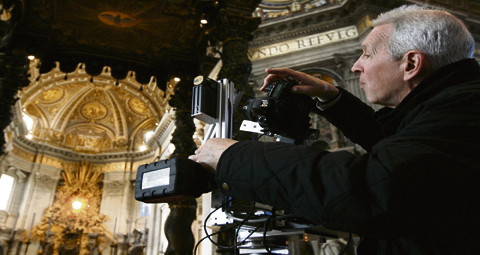
Strong in Faith: Does the Church seem too focused on sexual morality?
— Young Catholics have their say. Next time: Do we take Lent seriously enough? Pots you thoughts at http://www.facebook.com/scostronginfaith
Adam Coates
No. And if it seems that way it is because society is overly sexualised. The Church must be clear in its condemnation of illicit use of sex, contraception, and other social problems. If not then it is false charity on our part and thus a sin.
Thomas Schaab
Yes, it does seem to be overly focused on sexual morality. Considering how little Jesus said about sexuality and how many, much more pressing, issues there are, it is quite bewildering, especially to outsiders, how much the Church focuses on sexuality or the prohibition of it. I think the reason for this seeming to be overly prominent in the life of the Church might be that the internal struggle surrounding that topic is very visible to outsiders; plus all the attention ‘equal’ marriage has attracted…
Fee Doh
I think I have to agree with Thomas, I often feel like the focus on sexual morality to the neglect of other areas of theology obscures the beauty of the Church and Her message of unconditional love. In fact I think that the wider media focuses on these issues because they know how to make the Church seem most ugly. At the same time I think that sexual morality should not be hidden and ignored and the Church does a great service by simply being stable and clear on its stance. The challenge as ever is to communicate the truth but not legislate beyond that. A focus on sexual morality can even be healthy as long as what it communicates is a message of love and not of discrimination and judgement.
David Lundie
I think the challenge is expressing Catholic teaching on marriage, family and sexuality, and its connection to wider social issues, in a thoughtful and clear way. What I mean is to explain the difficult social processes by which a society with strong families helps alleviate material and cultural poverty, helps facilitate hospitality to the stranger, helps to bring about better working conditions, stronger links between people and politics, and so on.
If we can show how these values relate to building a better world, we can make them relevant. Too often, media and Catholic apologists take an approach that counts these things as obvious, and this just looks like magical thinking. We need to avoid magical thinking that suggests ‘if we get rid of abortion and divorce then the world will be perfect, God will bless us, and we won’t have to worry about climate change or the recession ever again!’
Obviously this isn’t true, and it isn’t what the Church teaches, but sometimes it is what people hear when the Holy Father talks about social ills and same sex marriage in the same sermon. Our task is to explain to the world how the two are rationally linked.
Gerald Bonner
In reality sexual morality is almost never mentioned at the local level. Then again, it is much the same with all the other virtues too—they may be mentioned a bit more often than chastity is, but too often they are reduced to platitudes which are meaningless in front of the real temptations of everyday life. What is needed to dispel false impressions is a far clearer proclamation of the beauty of the Church’s teaching on sex, and at the same time a far more rigorous approach to all moral issues. ‘Sin’ and ‘virtue’ need to be restored to our vocabulary—and the real struggle to be virtuous that we face, in all areas of life, needs to be recognised.
Fraser Davidson
I don’t think the Church focuses enough on sexual morality since it is a significant issue that affects a lot of young Scottish Catholics who are trying to find their way in the world. I was glad when I heard Pope Benedict XVI address the young people of Glasgow in 2010 when he said: “There are many temptations placed before you every day—drugs, money, sex, pornography, alcohol—which the world tells you will bring you happiness, yet these things are destructive and divisive.”
Chris McLaughlin
I am 32-years-old and have never heard a homily on pre-marital sex, contraception, Humanae Vitae, pornography, abortion or co-habitation. The truth is that we don’t hear nearly enough about these issues in the pews. I don’t know if the priests bottle out of it, or if they’ve been told to go easy, or that they don’t see it as appropriate, but the truth is unless you get the message across on a Sunday, most people won’t hear it at all. The overwhelming majority of the Faithful don’t read the Catholic press or frequent internet pages like this. I seriously doubt if even 10 out of 100 Mass-going Catholics in Scotland could explain the Church’s position on contraception in terms of what the doctrine is and why. Given that is so, it doesn’t surprise me that few people abide by it.
Gerald Bonner
The problem is that teaching on these matters has been left to a few people, mainly recent Popes, who are pilloried in the press for it while there is silence locally. This leads to the false impression of a ‘sex-obsessed Church,’ and widespread dissent in reality. We need to hear the truth, often and locally, otherwise the struggle to be virtuous is just too difficult (and again, this goes for all the virtues, not just chastity).
Juls Tapia
I don’t think so; it is just given the importance needed. There are many resources that the Church puts at our disposal for us to understand better the place of our sexuality in God’s plan. However I am not sure how many of us are aware of them and consult them. But I think everyone would benefit from them and would find more about the Church’s teaching on sexual morality.
NEXT TIME: Do we take Lent seriously enough? How can we make the most of it in this Year of Faith?
Have your say online at http://www.facebook.com/scostronginfaith
Disparity between Church and media perceptions of it
—
Feb 1 2013
We can see that there are two issues here: firstly, whether the Church subjectively appears to be too focused on sexual ethics; and secondly, whether the Church objectively is too focused on sexual ethics.
The first is essentially a question of perception, and so the answer will vary depending on our own experiences. This clearly shows through in the discussion. In the secular media, most stories on Catholicism involve questions of sexual morality, but in the day-to-day life of an individual Catholic at the parish level, these questions may in many cases rarely be discussed. It certainly seems fair to say that there is a discord between the Church’s image in the media and what is actually taught within the Church. It could certainly be argued that the one seems too focused on sexual morality while the other does not seem focused enough.
But why does the Church talk about sexual morality at all? Simply put, a right understanding of human sexuality is essential to any understanding of human being and meaning. Of course, sexuality goes beyond the sexual act to all that it means to be male and female. We find this meaning in the Creation story (Genesis 2:25) and it is also reemphasised by Christ (Matthew 19:4-5): human life and sexuality flow from our being created male and female. And so we can see that a faulty understanding of human sexuality can prevent us from fulfilling our true being and potential.
It is also true that the Church can seem so focussed on sexual morality simply because that is what people are interested in and take notice of. For example, this discussion topic was easily the most popular of all our discussions so far. In the secular press, the problem is exaggerated yet further: while there would be no space for a story on belief in Christ, there would be for a story on the Church and contraception. When it comes to the Church, it is only the stories about sexual ethics that make it into the mainstream and so become widely known.
Even so, we do have to be careful not to talk about sexual morality at the expense of other aspects of Catholic theology and teaching. Instead, it must be part of a well-rounded presentation of life in all its fullness and beauty.
All this leaves a few questions for us all to ponder: How can the Church teach the truth about sexual morality without seeming obsessed by it? How can we get people interested in the fullness of the Gospel message, and not just sexual ethics?
And how can we within the Church become more familiar and appreciative of the depth and breadth of these teachings?











Hello, my friends at the SCO! It has been a long time. Too long
I certainly agree with Chris McLaughlin.
I’m 15 years old and I can safely the Church IN SCOTLAND does not focus on enough on these issues. I have never once heard a homily on sexual morality, pre-marital sex, contraception, Humanae Vitae, pornography, masturbation, abortion or co-habitation. Sometimes, yes, teachers at school touch on these subjects, but fail to explain them philosophically and more importantly, theologically; and thus, as a result of this, many are confused more than they are sound in their understanding of the Catholic Faith and it’s Doctrines. Rome, other Episcopal Conferences and the Holy Father certainly seem to be doing a lot to enforce Catechesis and true understanding, but in Scotland sadly, Catholic Education in schools is becoming far too easy, and increasingly liberal. Would you be surprised if I told you that once I asked if anyone in my “RE” class knew what the words Catechesis or Theology meant, no-one, not one person in the room responded. Sometimes I almost feel it’s left to me to teach my friends about the faith and it’s teaching, and ‘Deo Gratias’ that they listen to me.
Personally, I think that it’s just poor formation of faith and a weak approach to teaching that doesn’t promote traditionalism, but thankfully the “hippy-happy” Church that spiraled out of a mass misconception of Vatican II and it’s documents is easing away into the darkness, and a strong zeal and fervour of the Faith is returning to young Catholics. Let’s face it, we will have to be ever-stronger Catholics in our ever-secularising world.
Sorry for the “Hell, Fire and Thunder from the Pulpit”, but as a Young, I feel it’s time we ensure “catholic Education”, regains it’s capital “C”.
Yours in Christ,
Jamie